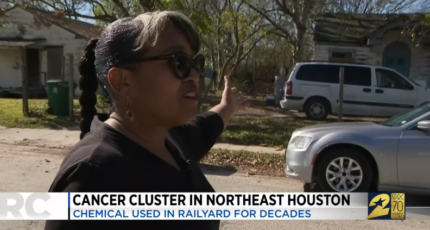Something was in the water. For more than a year and a half after their source of public water was switched from Lake Huron to the Flint River in April 2014, residents of the majority African-American city of Flint, Michigan, consistently complained of the foul brown liquid flowing from their faucets. People were breaking out in rashes and losing clumps of hair, children were increasingly having behavioral problems and falling ill, the fertility rate was dropping as miscarriages increased, infectious disease was spreading, and some even died. Independent university researchers had found the water dangerously toxic, a class-action lawsuit had been filed, and even General Motors had been forced to shut off the water at their local engine plant over the corrosive damage it was doing to their automobiles.
Yet, despite scientific evidence and the mushrooming health crisis, local, state and federal officials continued to deny and conceal the problem, characterizing the water as safe and even encouraging Flint residents to drink and bathe in the toxic liquid. In October 2015, the growing outrage would finally prompt the city’s reconnection to its original water source.
But the crisis was far from over. On December 14, 2015, Flint’s newly-elected mayor Karen Weaver —who had ridden the wave of water woes into office — declared a state of emergency, placing the poisoning of Michigan’s seventh-largest city squarely in the soiled hands of state and local leaders. “The City of Flint has experienced a man-made disaster,” stated Weaver, depicting how “children have experienced increased blood lead levels since the switch to the Flint River.” Such damage continued the statement, “is irreversible and can cause effects to a child’s IQ, which will result in learning disabilities and the need for special education and mental health services and an increase in the juvenile justice system.”
It was truly a watershed moment, the first time the city leadership officially acknowledged the depth of the problem and its apparent human cause. It marked an extraordinary development in a devastating chain of events first initiated by Michigan governor Rick Snyder’s highly controversial appointment of an unelected emergency manager to oversee Flint’s finances. In what has been cast as a cost-saving measure, the state — through its manager, the Michigan’s Department of Environmental Quality (MDEQ), and city leaders — elected to switch the city’s water source to the Flint River and bypass well-established public safety protocols for treating the new source with anti-corrosive agents. This protective agent would have run $100 a day, a cost these officials wanted to avoid.
Today, two years after Weaver’s emergency declaration and three-and-a-half years since the city switched its water source, the dire consequences of this decision remain unavoidable. Although there is a steady push to replace thousands of old lead-leaching pipes running from water mains to houses — as of October, the city had replaced service lines to 5148 homes — the ongoing damage and extraordinary toll the crisis has taken on Flint residents could go down as one of the great crimes of the 21st century. State health officials confirmed 91 cases of Legionnaire’s disease in the Flint area, including 12 deaths, in the 17-month period coinciding with the water source switch. Consistently, fertility rates decreased by 12 percent among Flint women, and fetal death rates increased by 58 percent, according to research by two university health economists who concluded that “between 198 and 276 more children would have been born had Flint not enacted the switch in water.” And given there is no ‘safe’ level of lead in the body, and its impacts are known to be most severe on the developing brains and nervous systems of children and fetuses, it is near impossible to account for the ongoing and future effects on the intelligence, behavior, cognition, emotions and life outcomes of Flint’s children.
“Unfortunately, the Flint water crisis is alive and well,” said Claire McClinton, of the Flint Democracy Defense League. The former union organizer grew up in Flint. “We have been very distressed with the response of the federal government and the state especially,” reported McClinton, noting they have been slow to respond and that “every time they hear of the slightest improvement in the lead levels they almost declare that the crisis is over. So it’s been a challenge for us activists to keep the issue alive and let folks know it’s not over.”
McClinton depicted how activists and citizens groups in Flint are still advocating for expedited pipe replacement, additional disaster relief, and “Medicare for all impacted residents.” She cited how former U.S. Senator Max Baucus got a provision put in the Affordable Care Act specific to his home state of Montana that granted Medicare to residents in the asbestos-poisoned town of Libby, Montana. “Why can’t Flint, Michigan, get that?” begged McClinton. “We’ve got kids who need both physical and mental supplements to deal with this poisoning, so we need a guaranteed health care program.”
“The national spotlight is gone at this point, so people have moved on,” offered David Alexander Bullock, a Detroit-based organizer and pastor of the Greater St. Matthew Baptist Church in Highland Park, Michigan. Founder of the Change Agent Consortium, a national coalition advocating for social change, Bullock led a 2016 effort to recall Snyder based on his mishandling of the Flint water crisis and the dire financial status of Detroit’s public schools. “But people fail to realize there are folks who likely still have lead leaching off of pipes into their homes, that are still living off of bottled water, and that will have no resolution to those issues in sight for a number of years.”
After pointing out how “near impossible” it is for Flint’s homeowners to move on given both their bodies and houses are saddled with lead — the latter affecting property values and their capacity to sell — Bullock decried the ongoing lack of accountability. “Essentially, there has been no one brought to justice for the Flint water crisis,” he said, noting unanswered questions about the complicity of Snyder and how “no real actor has been brought to justice in this case.” While acknowledging the recent charges filed against over a dozen state and local officials, Bullock clarified where the majority of the blame lies. “I’d have to put this crisis at the feet of the governor,” he said, noting Snyder’s culpability is “part of a larger story, which is the public policy of emergency management in Michigan.” It is an undemocratic process that Bullock has labeled “receivership on steroids. You get these state-appointed managers that have unilateral authority over all branches of government. They are the city council and they are the executive branch as one man, or one woman, controls all things.”
In 2011, Snyder and a Republican-controlled state legislature passed an emergency manager law known as Public Act 4 which allows state-appointed managers to usurp the power of locally elected officials in the name of “fiscal responsibility.” Under the guise of cost-saving, these managers can also sell off city assets and public services like education, sanitation, real estate and criminal justice systems to private contractors and break union contracts. Such measures have been criticized for both stripping citizens of their local voting rights and selectively being applied, as in Michigan, to predominantly African-American cities. “Tell me what race dominates in those communities that get emergency managers?” quipped Hubert Yopp, mayor of Highland Park, in January 2016, a city over 90 percent Black. “It would be one thing if the emergency managers worked with the local governments to make things better. But it’s about having dictator power in the city. The locals have no say.”
Bullock referenced numerous Michigan cities, including Detroit and Benton Harbor, where such state-sponsored austerity policies have failed before stressing how “the crisis in Flint can be laid at the feet of the emergency manager, which is Governor Snyder’s signature urban policy.” The decision to switch the water source, continued Bullock, was “made by the emergency manager, who only has to report to two people, the state treasurer and the governor. So I don’t see how you can excuse Governor Rick Snyder, who is the direct boss of the emergency manager.”
“We do need to get rid of this onerous emergency manager law,” echoed McClinton, describing it as a “dismantling of democracy in local municipalities. And it’s done, not just to be mean and steal democracy from predominantly African-American cities, but for the purpose of getting into these cities and taking your most precious assets that you have built and maintained all of these years and handing them over to private corporations, bondholders and hedge-funds for pennies on the dollar, while stealing public assets away from the people.”
Even so, the longtime Flint resident managed to pull some positive aspects from the manmade disaster plaguing her hometown. Along with her gratitude for the generous and ongoing response of everyday citizens across the country, McClinton pointed out how “the Flint water crisis became an engine for other cities to check out their water supplies, and many found their water was not as safe as they thought it was. So our tragedy has contributed to an awakening.”
That said, ultimately, McClinton and Bullock agree that the ongoing catastrophe in Flint is a tragic testament to what can happen when democracy is denied to the everyday citizens it was created to serve.
“There’s something about democracy that is messy and slow, complex and convoluted,” acknowledged Bullock, noting the customary processes of elections, recalls, public meetings, comment and other ways a city’s elected officials engage citizens with important decisions affecting their daily lives. Just the democratic process alone, he insisted, “would have raised so many flags that there would have been a more substantial conversation about the switch.”
“But this idea that the answer to urban problems is austerity and fiscal responsibility without any democratic transparency creates the opportunity for all kind of bad public policy decisions,” continued Bullock. “So when the governor appoints an emergency manager and suppresses democracy, you get the Flint water crisis.”


